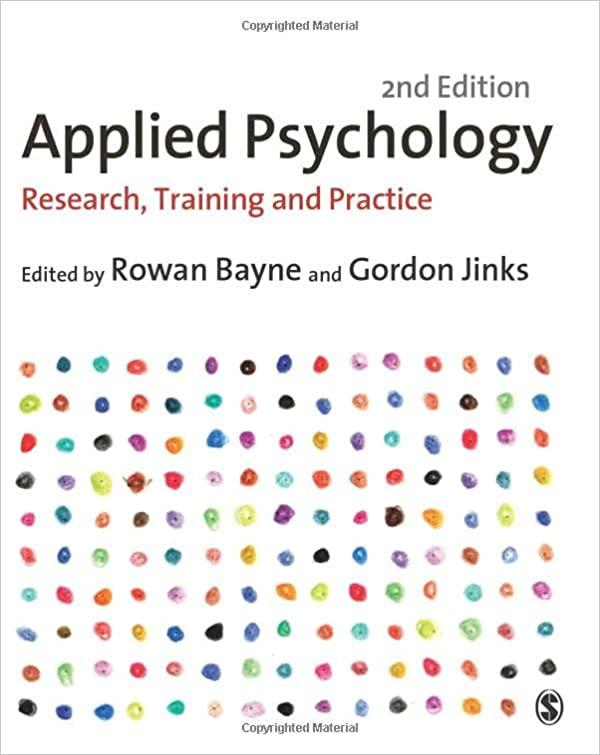Question
Please give an original response (do not copy and paste) to the post below. At least 200 word response, using at least 1 scholarly citation
Please give an original response (do not copy and paste) to the post below. At least 200 word response, using at least 1 scholarly citation that is within the last 5 years. Websites ae NOT preferred sources. List reference/references used.
In general, wouldMotivational Interviewingbe a good practice for her?
Based on the narrative, motivational interviewing (MI) would benefit Marci. MI helps in dealing with the ambivalence that Marci has concerning her use of marijuana. She admits that marijuana has negatively impacted her relationship with her parents, school performance and working towards her dreams. She also confesses that she would like to continue using marijuana if she has the assurance no one would find out. Therefore, motivational interviewing can move her towards change (Bischof et al., 2021).
MI has an element of working together and evocation towards change (Bischof et al., 2021). Therefore, Marci can use it to actively engage with a therapist and make decisions regarding the best treatment for her, hence allowing the practice of autonomy. The narrative highlights Marci's concerns and fears, making MI a suitable approach for addressing her feelings of depression, anxiety, and paranoia associated with substance use. Moreover, MI's non-confrontational aspect matches Marci's initial resistance to acknowledging her problems (Bischof et al., 2021).
Transitional Summary
"Marci, I heard you say that some of the challenges you're facing with substance use, depression, and anxiety include a compromised relationship with parents, poor focus on school work and progress on personal goals. Embracing positive change can play a part in finding solutions to these issues. Philippians 4:13 says, "I can do all things through Christ who strengthens me." You have it within you to overcome these challenges and make positive changes (New King James Bible, 2020). Additionally, Proverbs 3:5-6 encourages us to trust in the Lord with all our hearts and lean not on our understanding (New King James Bible, 2020). We can work towards a healthier, more fulfilling life that suits your needs through collaboration and trust.
Treatment Strategies
Xu and Labar (2019) asserted that various therapeutic intervention strategies need to be combined, including pharmacological treatments and evidence-based cognitive behavioral therapies, to achieve effective treatment and long-term recovery from addiction. When one of these treatments is used alone, it may not adequately sustain recovery from addiction, not fully restore the affected system and prevent relapse; therefore, an integrated approach to treatment is more effective (Xu & Labar, 2019). Punishment tends to be the most ineffective way to deal with addiction and individuals with addiction. Volkow (2021) noted that being imprisoned enhances the risk of overdosing. For instance, if one had been imprisoned for addiction to opioids, having a relapse to such a substance can be fatal. Therefore, punishment does not treat addiction.
The 12-step program is one of the treatment approaches that closely aligns with a Christian worldview, offering support to those recovering from addiction and promoting resilience (Christians, 2017). This approach encourages individuals recovering from addiction to seek knowledge from a higher power and live by His will (Christians, 2017). Proverbs 3:5-6 states, "Trust in the Lord with all your heart, and lean not on your understanding; In all your ways acknowledge Him, And He shall direct your paths" (New King James Bible, 2020). Cognitive behavioral therapy (CBT) also aligns with the Christian worldview when adapted to religious aspects by incorporating religious content to restructure negative thoughts and irrational beliefs (de Abreu Costa & Moreira-Almeida, 2021). Philippians 4:8 states, Finally, brethren, whatever things aretrue, whatever thingsarenoble, whatever thingsarejust,whatever thingsarepure, whatever thingsarelovely, whatever thingsareof good report, ifthere isany virtue and ifthere isanything praiseworthymeditate on these things" (New King James Bible, 2020). Therefore, CBT aligns with realigning our thoughts to adhere to the Christian worldview.
References
Bischof, G., Bischof, A., & Rumpf, H. J. (2021). Motivational interviewing: an evidence-based approach for use in medical practice.Deutsches rzteblatt International,118(7), 109.
Christians, O. (2017). Social work & Christianity. Social Work & Christianity,44(4), 3-22.
de Abreu Costa, M., & Moreira-Almeida, A. (2021). Religion-adapted cognitive behavioral therapy: a review and description of techniques.Journal Of Religion And Health, 1-24.
New King James Bible.(2020). King James Bible online.https://www.kingjamesbibleonline
Volkow, N. D. (2021). Addiction should be treated, not penalized. Neuropsychopharmacology, 46(12), 2048-2050
Xu, B., & LaBar, K. S. (2019). Advances in understanding addiction treatment and recovery.Science Advances,5(10), 6596.
Step by Step Solution
There are 3 Steps involved in it
Step: 1

Get Instant Access to Expert-Tailored Solutions
See step-by-step solutions with expert insights and AI powered tools for academic success
Step: 2

Step: 3

Ace Your Homework with AI
Get the answers you need in no time with our AI-driven, step-by-step assistance
Get Started


